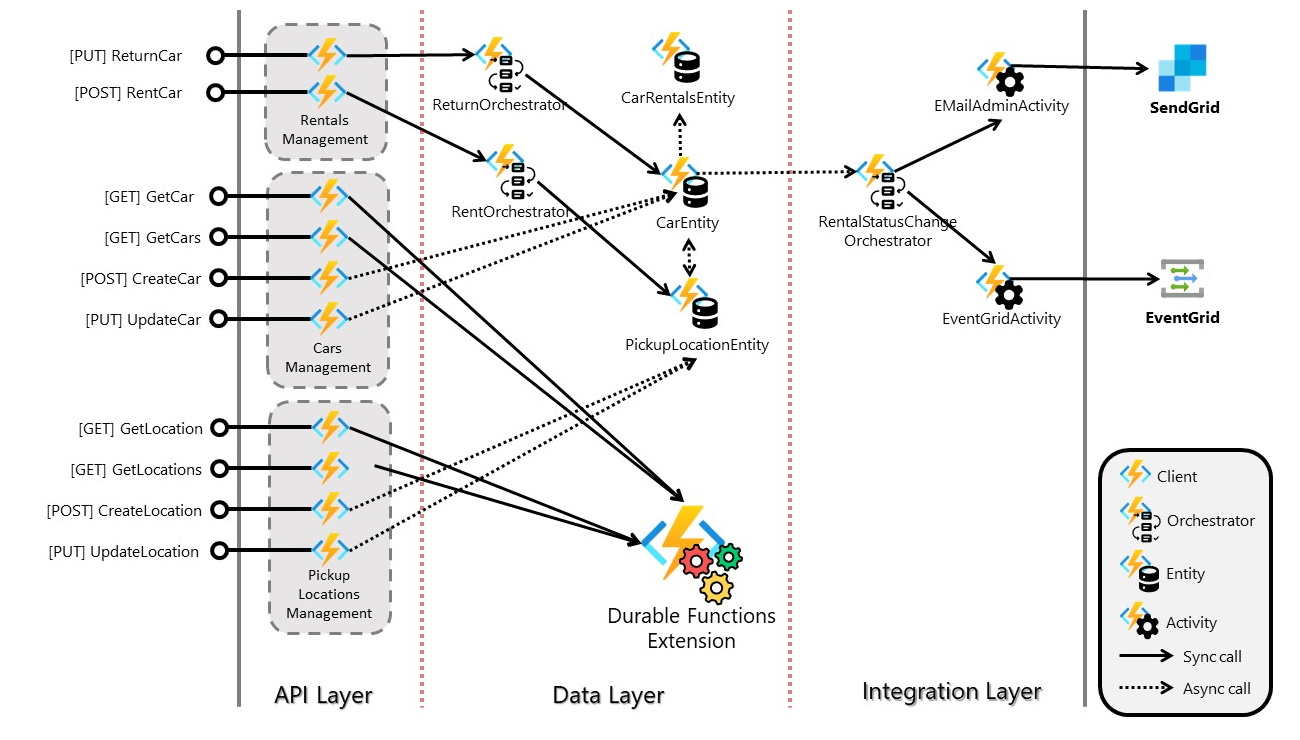This project use Durable Functions (in particular Durable Entities) to implement a simple Car Rent system.
The following image shown the architecture of the solution.
The solution is composed by three logical layers:
- API Layer: contains the Azure Functions (in particular Client Functions) that implement the REST API endpoints for the solution;
- Data Layer: contains two types of Functions:
- Durable Entities: implement the entities with state of the solution. Car, PickupLocation and CarRentals are the entity of the solution;
- Orchestrator Functions: implement the workflow called by the API Layer in which you need to interact with Entities in a synchronous way. One of this is the Rent Car scenario;
- Integration Layer: contains Orchestrator Functions and Activity Functions used to communicate with external services.
In this solution the Client Functions are used to expose a set of APIs (REST) and call orchestrators, entities and Durable Functions platform behind the scenes.
In this solution, we use the orchestrators in two different ways:
- to "sinchronize" operations between client and entity: a client can only execute a signal operation against an entity. This means that the client continues its own flow while the entity method of the signal operation will be called in asynchronous way. In some scenarios (e.g. rent a car), we need to wait the result of the operation, and to do that, we use an orchestrator.
- to implement integration flows from our solution to the external world.
This solution has three different entities:
- CarEntity: it manages a single car. Its status contains only the current rental (if exist).
- PickupLocationEntity: it manages a pickup location with different cars.
- CarRentalsEntity: it stores all the rental history for a car. Its status contains all the rentals completed for a specific car.
This solution uses activities to implement atomic operation for the external services integration (e.g. send an event to Event Grdi).
sequenceDiagram
actor App
participant RentCarClient
participant RentOrchestrator
participant PickupLocationEntity
participant CarEntity
participant DurableFunctionsExtension
App ->> +RentCarClient : [POST]
RentCarClient -->> RentOrchestrator : StartNewAsync
RentOrchestrator ->> +PickupLocationEntity : CallEntityAsync -> RentCar
critical if car belong to the location and can be rented
PickupLocationEntity --) CarEntity : SignalEntity -> Rent
Note over PickupLocationEntity,CarEntity: Fire and forget communication
end
PickupLocationEntity ->> -RentOrchestrator : Rent car result
RentCarClient ->> DurableFunctionsExtension : GetStatusAsync(idOrchestrator)
critical if orchestrator status is completed
Note over RentCarClient: Retrieve the orchestrator status<br/>from the GetStatusAsync result
end
RentCarClient ->> -App : Rent car response
sequenceDiagram
actor App
participant ReturnCarClient
participant ReturnOrchestrator
participant CarEntity
participant CarRentalsEntity
participant PickupLocationEntity
participant RentalStatusChangeOrchestrator
participant DurableFunctionsExtension
App ->> +ReturnCarClient : [PUT]
ReturnCarClient -->> ReturnOrchestrator : StartNewAsync
ReturnOrchestrator ->> +CarEntity : CallEntityAsync -> Return
critical if car can be returned
CarEntity --) CarRentalsEntity : SignalEntity -> AddRent
CarEntity --) RentalStatusChangeOrchestrator: StartAsync
CarEntity --) PickupLocationEntity : SignalEntity -> CarStatusChanged
Note over PickupLocationEntity,CarEntity: Fire and forget communications
end
CarEntity ->> -ReturnOrchestrator : Return car result
ReturnCarClient ->> DurableFunctionsExtension : GetStatusAsync(idOrchestrator)
critical if orchestrator status is completed
Note over ReturnCarClient: Retrieve the orchestrator status<br/>from the GetStatusAsync result
end
ReturnCarClient ->> -App : Response
